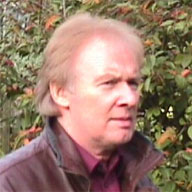 Letters for a Grandchild
Letters for a Grandchild
I
Invasion
You may not remember him well.
Nor fully understand how at one stroke
He was pinioned by pain and fearful shadows.
His house, brought down by a bullet of blood,
Trapped him in the wreckage of himself.
Doctors reached inside to shore him up.
They could not release him, could not
Untangle the clenched nerves, nor arrest
The dereliction of his powers. Friends gathered.
Their kind hands touched the warm masonry,
And remembering them, he sang the old songs.
His memories were glittering mirror-glass.
We rooted for him to march out from there.
They would have hung out all the flags,
Commandeered a brass band polished like a poem
While the family wheeled the world
outside his window.
II
The Campaign
His songs were rallying songs.
Inside that frail confusion — stick
And bone — was a man fighting
His third world war, practically singlehanded.
On that battlefield he had to dress smartly,
Be clean-shaven, handle a blade with precision :
Too much for one man's plate;
When the scrap or morsel fell
His pride was splashed with shot and shell.
At night it was the dreadful apparatus
Of the watch; his cabinet meticulously organised,
He was the lonely sentry
Grappling with the challenge of drugged sleep,
Executing the manoeuvres to relieve
Himself, whistling in the dark.
We served him
Well short of the front line.
His war was far out. Communications not good,
We were the obtuse tacticians hardly within earshot;
We were the cushioned armchair corporals
Quarrelling with the Field Marshal —
That gentle man who had to make demands
Which were offensive.
War is revolting, always intolerable.
We were the idiot politicians who were his masters;
And also the dolts who fumbled his ammunition.
He was ours — the prisoner of War —
And we were the folks back home . . .
III
Final Assault
(Jack & the Dragon)
By day, Time measured a painful landscape.
Minute landmarks were never trivial.
Yet he wrote to us of the boyhood army
Who marched with arms shouldered
Up to the Dragon Mouth Rock :
How the clock's tick plotted cruel diversions.
His urgent call, an echo from that bouldered hill,
Spoke through the Family House
Requiring an assembly of his Company;
Old friends, new friends — the regular pain killers.
I picture him shouldering the full kit: that monumental
Pack; his khaki, ready to merge with the dead
Stones near the Moor's edge; his quickened blood
Suddenly on the march, doubling
Through the Ravenshaw of memory.
I imagine him remembering the fled years :
The salute among chapel-green shadows
And the leafy murmuring of the voices
That followed him, out into the shining silence
Of the hillside light.
Breathless now
On the high road. The cool cartridge loaded
Under cover of ethereal flowers;
The slender stock and barrel raised,
Bayonet-petaled; ready for the crack
And the lance of the growing heart's thunder.
Here at the end,
With that grim Time fully scaled; the map drawn,
Committed to fire; his triggered seed
Bolted, like smoke, into the blazing dark —
I picture him on the Dragon Hill
Through the tumbled wall, his gorgeous fire,
And the rage in the Rock's Mouth
Raging, still.
IV
Cenotaph
I remember him in a wartime garden
Among broken quartz and roses.
His brass and webbing seemed like armour to me
I could not lift the rifle by the door.
He'd smile at the curious son by his knee.
My words echoing your words now :
Daddy, what did you do in the war?
Me? I was unfit for active service. Passed A1.
Fit only to be his second cook and spittoon washer.
Given the chance I would have been in there
Fighting alongside him, death's dark
Jaws and all. Straight up!
After six years I don't think he needed any prayers.
Who could believe in a Christ who had to be
Called-up to lend a hand for a bloke like him?
He must have known — full well — few lads
Have shouldered a more un-called-for burden.
Six years. It was no afternoon stagger
Up the back of Jerusalem.
Anyway, I reckon he won.
It was all over by Christmas.
And he came home to us bearing his gift of Peace.
V
Gulf
I dreamed I found my father (dead for
Ten years now) shrouded in my boyhood bed.
The house in Skipton — midnight 1944.
The blackout blinds tight shut.
A candle and a curtained door.
No sound. His eyes, distressful, spoke to me
Inside his skull. My question
Was a gesture turned in fearful air
For kneeling by the shadowed bed —
An unknown soldier clasped his covered head.
Was he the man dad shot that year, in Ireland,
Staining the Shankhill Guardroom floor?
In dream he seemed all men a child had lost;
Drilled squaddie, shelled marine,
charred conscript in Iraq;
All men who lose their boyhood wish it back.
Suddenly awakened by a howling jet, the thought
"Cruise missiles, close to home!" irrationally broke —
And exhumed a memory : the boy aged four
Crying Mother! as the Luftwaffe poured
Unfriendly fire on Rombald's Moor.








